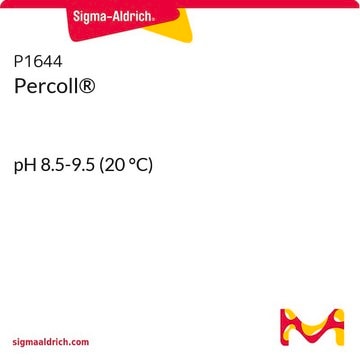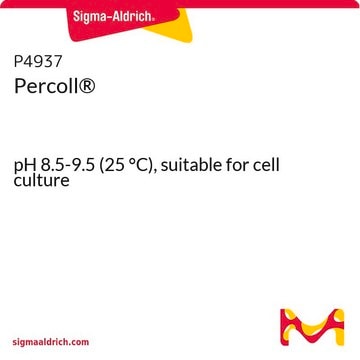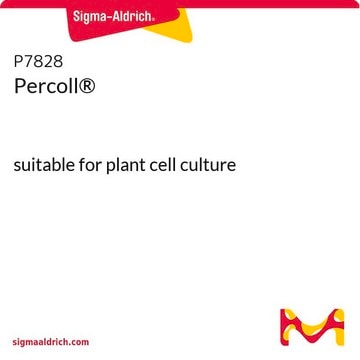現在、価格および在庫状況を閲覧できません。
おすすめの製品
フォーム
colloidal (Colloidal solution of silica coated with polyvinylpyrrolidone (PVP))
liquid (Suspension)
solution
包装
pack of 1 L
メーカー/製品名
Cytiva 17-0891-01
テクニック
cell culture | mammalian: suitable
色
Colorless to slightly yellow
pH範囲
8.5-9.5
密度
1.13 g/cm3
保管温度
2-8°C
詳細
Percoll® is a well-referenced media for density gradient centrifugation of cells, viruses, and subcellular particles. Percoll® is composed of colloidal silica coated with polyvinylpyrrolidone (PVP).
Percoll® is a low viscosity density gradient medium for preparation of cells, subcellular particles, and larger viruses. The low viscosity of the medium enables cell preparation on preformed gradients in only a few minutes using low centrifugal forces (200 to 1000 × g). The medium is available in easy-to-open, resealable 250 mL and 1 l bottles.
Percoll® consists of silica particles (15 to 30 nm diameter) coated with non-dialyzable polyvinylpyrrolidone (PVP). Free PVP is present at only 1% to 2%. Percoll® is non-toxic, almost chemically inert and does not adhere to membranes. Percoll® gradients can be formed within the density range of 1.0 to 1.3 g/mL, and are iso-osmotic throughout.
Percoll® can be stored unopened at room temperature for five years. At -20° C, it can only be stored for up to six months. If stored at -20° C, gradients form upon thawing, necessitating a mixing of the bottle before use. Preformed gradients can be stored for weeks without a change in gradient shape, provided that the gradient remains unfrozen. Percoll® can be buffered within the pH range 5.5 to 10.0 without any changes in properties. If the pH is dropped below 5.5, gelling may occur. Gelling can also be caused by the presence of divalent cations, an effect which is exacerbated by elevated temperatures.
Percoll® is a low viscosity density gradient medium for preparation of cells, subcellular particles, and larger viruses. The low viscosity of the medium enables cell preparation on preformed gradients in only a few minutes using low centrifugal forces (200 to 1000 × g). The medium is available in easy-to-open, resealable 250 mL and 1 l bottles.
Percoll® consists of silica particles (15 to 30 nm diameter) coated with non-dialyzable polyvinylpyrrolidone (PVP). Free PVP is present at only 1% to 2%. Percoll® is non-toxic, almost chemically inert and does not adhere to membranes. Percoll® gradients can be formed within the density range of 1.0 to 1.3 g/mL, and are iso-osmotic throughout.
Percoll® can be stored unopened at room temperature for five years. At -20° C, it can only be stored for up to six months. If stored at -20° C, gradients form upon thawing, necessitating a mixing of the bottle before use. Preformed gradients can be stored for weeks without a change in gradient shape, provided that the gradient remains unfrozen. Percoll® can be buffered within the pH range 5.5 to 10.0 without any changes in properties. If the pH is dropped below 5.5, gelling may occur. Gelling can also be caused by the presence of divalent cations, an effect which is exacerbated by elevated temperatures.
アプリケーション
Used in balanced salt solutions, physiological saline or 0.25 M sucrose.
特徴および利点
- For separation of cells, subcellular particles and larger viruses (down to ~ 70S) under gentle conditions which preserve viability and morphological integrity.
- Non-toxic to cells.
- Adjustable to physiological ionic strength and pH.
- Gradients can either be preformed or spontaneously generated by centrifugation at moderate speeds in an angle-head rotor.
- Gradients are iso-osmotic throughout and cover a range of densities up to 1.3 g/mL.
保管および安定性
Please be aware this product may be shipped 90 days before the expiration date. For more information on the batch specific expiration date, please contact technical service.
Store at 4 to 30 °C ()
アナリシスノート
この製品の分析証明書は、www.cytiva.com.
法的情報
Percoll is a registered trademark of Cytiva
保管分類コード
12 - Non Combustible Liquids
WGK
WGK 3
引火点(°F)
Not applicable
引火点(℃)
Not applicable
最新バージョンのいずれかを選択してください:
この製品を見ている人はこちらもチェック
Jean-Christophe Beltra et al.
Immunity, 52(5), 825-841 (2020-05-13)
CD8+ T cell exhaustion is a major barrier to current anti-cancer immunotherapies. Despite this, the developmental biology of exhausted CD8+ T cells (Tex) remains poorly defined, restraining improvement of strategies aimed at "re-invigorating" Tex cells. Here, we defined a four-cell-stage developmental framework
Jamie S Church et al.
Glia, 65(6), 883-899 (2017-03-03)
Oligodendrocyte progenitor cells (OPCs) are present throughout the adult brain and spinal cord and can replace oligodendrocytes lost to injury, aging, or disease. Their differentiation, however, is inhibited by myelin debris, making clearance of this debris an important step for
Qun Wang et al.
Proceedings of the National Academy of Sciences of the United States of America, 117(45), 28212-28220 (2020-10-28)
Somatic mutations are major genetic contributors to cancers and many other age-related diseases. Many disease-causing somatic mutations can initiate clonal growth prior to the appearance of any disease symptoms, yet experimental models that can be used to examine clonal abnormalities
Joseph R Albe et al.
PLoS pathogens, 15(6), e1007833-e1007833 (2019-06-21)
Rift Valley fever virus (RVFV) causes severe disease in livestock concurrent with zoonotic transmission to humans. A subset of people infected with RVFV develop encephalitis, and significant gaps remain in our knowledge of how RVFV causes pathology in the brain.
Ailan Zhang et al.
Cellular and molecular gastroenterology and hepatology, 10(2), 309-326 (2020-04-25)
In short-bowel syndrome (SBS), inadequate intestinal adaptation is responsible for the majority of complications, including sepsis, liver failure, and death. In this study, we sought to further delineate the adaptive response to identify potential therapeutic targets. We performed a 75%
プロトコル
To prepare a Percoll gradient, the osmolality of Percoll must be adjusted with saline or cell culture medium to make Percoll isotonic with physiological salt solutions.
ライフサイエンス、有機合成、材料科学、クロマトグラフィー、分析など、あらゆる分野の研究に経験のあるメンバーがおります。.
製品に関するお問い合わせはこちら(テクニカルサービス)









